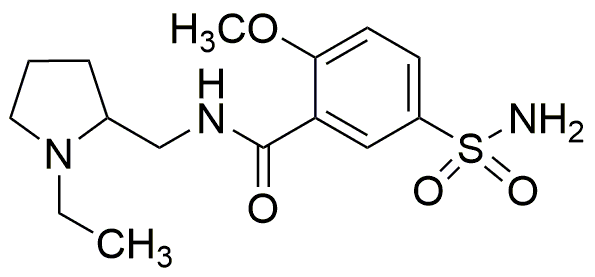(±)-Sulpiride is widely utilized in research focused on
- Psychiatric Treatments: Commonly used as an antipsychotic, it helps manage conditions like schizophrenia and depression, providing relief for patients who may not respond to other medications.
- Gastrointestinal Disorders: It has applications in treating functional gastrointestinal disorders, such as dyspepsia, by enhancing gastric motility and reducing symptoms.
- Research on Neurotransmitter Activity: Utilized in studies examining dopamine receptors, it aids researchers in understanding neurological pathways and the effects of neurotransmitters on behavior.
- Drug Development: Its unique properties make it a candidate for developing new therapeutic agents, particularly in the field of psychopharmacology, where understanding drug interactions is crucial.
- Animal Studies: Often used in preclinical trials, it helps in evaluating the efficacy and safety of new treatments, providing valuable insights before human trials.
Informations générales
Propriétés
Sécurité et réglementation
Applications
(±)-Sulpiride is widely utilized in research focused on
- Psychiatric Treatments: Commonly used as an antipsychotic, it helps manage conditions like schizophrenia and depression, providing relief for patients who may not respond to other medications.
- Gastrointestinal Disorders: It has applications in treating functional gastrointestinal disorders, such as dyspepsia, by enhancing gastric motility and reducing symptoms.
- Research on Neurotransmitter Activity: Utilized in studies examining dopamine receptors, it aids researchers in understanding neurological pathways and the effects of neurotransmitters on behavior.
- Drug Development: Its unique properties make it a candidate for developing new therapeutic agents, particularly in the field of psychopharmacology, where understanding drug interactions is crucial.
- Animal Studies: Often used in preclinical trials, it helps in evaluating the efficacy and safety of new treatments, providing valuable insights before human trials.
Documents
Fiches de données de sécurité (FDS)
La FDS fournit des informations de sécurité complètes sur la manipulation, le stockage et l’élimination du produit.
Spécifications du produit (PS)
Le PS fournit une description complète des propriétés du produit, notamment sa composition chimique, son état physique, sa pureté et les exigences de stockage. Il détaille également les plages de qualité acceptables et les applications prévues du produit.
Certificats d'analyse (COA)
Recherchez des certificats d'analyse (COA) en saisissant le numéro de lot du produit. Les numéros de lot et de lot se trouvent sur l'étiquette d'un produit, après les mots « Lot » ou « Lot de fabrication ».
Numéro de catalogue
Numéro de lot/série
Certificats d'origine (COO)
Ce certificat d'exploitation confirme le pays dans lequel le produit a été fabriqué, et détaille également les matériaux et composants utilisés et s'il est issu de sources naturelles, synthétiques ou autres sources spécifiques. Ce certificat peut être requis pour les douanes, le commerce et la conformité réglementaire.
Numéro de catalogue
Numéro de lot/série
Fiches de données de sécurité (FDS)
La FDS fournit des informations de sécurité complètes sur la manipulation, le stockage et l’élimination du produit.
DownloadSpécifications du produit (PS)
Le PS fournit une description complète des propriétés du produit, notamment sa composition chimique, son état physique, sa pureté et les exigences de stockage. Il détaille également les plages de qualité acceptables et les applications prévues du produit.
DownloadCertificats d'analyse (COA)
Recherchez des certificats d'analyse (COA) en saisissant le numéro de lot du produit. Les numéros de lot et de lot se trouvent sur l'étiquette d'un produit, après les mots « Lot » ou « Lot de fabrication ».
Numéro de catalogue
Numéro de lot/série
Certificats d'origine (COO)
Ce certificat d'exploitation confirme le pays dans lequel le produit a été fabriqué, et détaille également les matériaux et composants utilisés et s'il est issu de sources naturelles, synthétiques ou autres sources spécifiques. Ce certificat peut être requis pour les douanes, le commerce et la conformité réglementaire.


